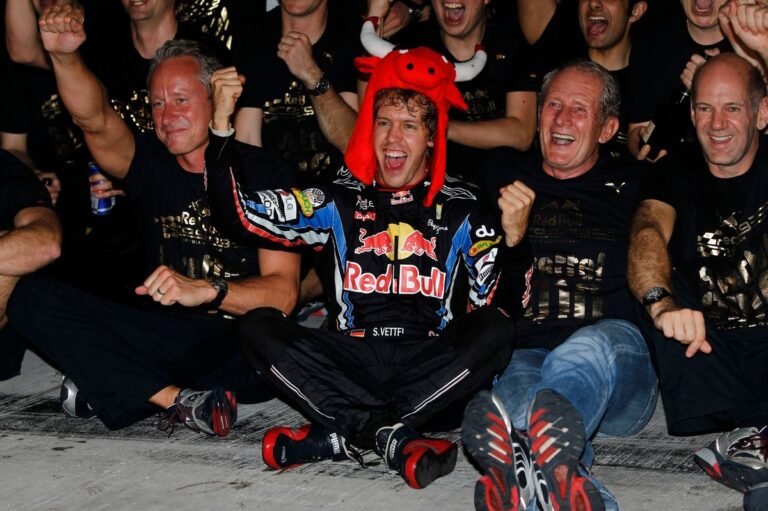The Future of Talent in Formula 1: Bridging Generations
Succession planning is often a tricky terrain for those at the pinnacle of any industry, whether it be business, politics, or motorsport. Leaders frequently see themselves as indispensable, often perceiving potential successors as threats to their position. In the glitzy but high-pressure world of Formula 1 (F1), this dynamic plays out in a particularly acute manner. It is a realm dominated by notable figures like Bernie Ecclestone, whose shadow still looms large, tangling others in the complexities of succession. One such figure is Dr. Helmut Marko, long-time advisor and talent scout for Red Bull Racing. His career, spanning several decades and intricately woven into the fabric of F1, showcases the challenges and shifts associated with identifying and prepping the next generation of talent.
Dr. Helmut Marko: A Legacy in Limbo
Dr. Helmut Marko, now 81, has carved a niche for himself as both a driver and later as a key decision-maker in F1, particularly with Red Bull Racing. His youth was defined by a close friendship with Jochen Rindt, F1’s first posthumous world champion, and their ambitions to form a racing team together. Although Marko’s own career as a driver was cut short due to an eye injury, he showcased a remarkable affinity for the sport, demonstrating both courage and skill in various competitions, including a notable victory at Le Mans. Over the years, he has evolved into the principal talent spotter for Red Bull, utilizing data science and his keen insight into racing to identify promising young drivers.
Marko’s legacy has been periodically overshadowed by the departure of influential figures like Dietrich Mateschitz and Niki Lauda, leaving him to navigate a shifting corporate landscape that has tested his resilience. With the recent regime changes at Red Bull following Mateschitz’s death, Marko’s role has become even more complex. His influence on the team remains significant; however, it’s evident that the mounting pressure of expectation, both from within Red Bull and the larger F1 community, has begun to weigh heavily on his shoulders. The ongoing saga of retaining Max Verstappen, a crucial asset for Red Bull’s future, has only added to Marko’s burden, showcasing how intertwined the fortunes of leaders and their successors can be.
The Rise of Sebastian Vettel: A Shift in Leadership Dynamics
Enter Sebastian Vettel, a former champion and a familiar face in the Red Bull family. After a highly successful F1 career that yielded four world championships, Vettel transitioned into retirement in 2022, ostensibly to spend more quality time with his family. However, the allure of motorsport tugged at him, leading him to explore various avenues within the industry, including engagements in environmental and educational initiatives. Perhaps more intriguing is Marko’s recent assertion that Vettel could be the ideal candidate to succeed him when the time comes. This pairing of old and new brings about a new narrative that questions how Vettel’s approach to leadership might differ from that of his mentor.
While Marko’s tenure has been defined by a ruthless pursuit of excellence, characterized by a zero-tolerance policy for underperformance, a potential Vettel-led regime might shift towards a more nurturing approach. The former driver has often been regarded as more empathetic and in tune with the emotional needs of budding drivers. However, Vettel’s understanding of the rigorous standards of excellence that F1 demands cannot be underestimated, as he himself has faced the high stakes and the relentless pressure to perform. This dichotomy of style encapsulates the essence of succession planning: how to balance an unyielding pursuit of success with the humanity required to cultivate talent.
The Challenges of Transitioning Leadership in F1
The prospect of Vettel stepping into Marko’s shoes is not devoid of challenges. While he carries with him a wealth of experience and insight into the sport, he will undoubtedly face the complexities of adhering to Red Bull’s high standards while also establishing his unique leadership style. It’s essential to recognize that while Vettel embodies a fresh perspective, he will still need to uphold the values that have defined Red Bull’s success. This includes an unrelenting quest for excellence and a willingness to make tough decisions regarding driver placements, which Marko has mastered over the years.
Moreover, the expectation for any successor in such a high-stakes environment as F1 is daunting. Vettel’s prior interactions with Marko have equipped him with firsthand knowledge of the demands and nuances of guiding young talent through the challenging landscape of motorsport. The fierce competition and the desire to secure the next champion can complicate the transition, especially in a business like F1 where pressure is ever-present, and public scrutiny looms large. As Vettel contemplates his transition into this potential role, he will need to balance his personal values with the ingrained practices that have brought Red Bull its success, navigating the inherent tension between nurturing talent and maintaining the relentless pursuit of victory.
In conclusion, the evolution of leadership within Red Bull Racing encapsulates not just the story of succession planning in Formula 1 but also a reflection of broader themes in leadership across industries. Behind the glamour and excitement of F1 lies a complex web of personalities, pressures, and legacies. As Dr. Helmut Marko prepares for his eventual departure, and as Sebastian Vettel begins to consider his future role, the path forward will require careful navigation. Ultimately, the way these two men approach the intricacies of leadership may shape not only their personal legacies but also the future landscape of Formula 1 itself, marrying the wisdom of experience with the enthusiasm of new vision.



